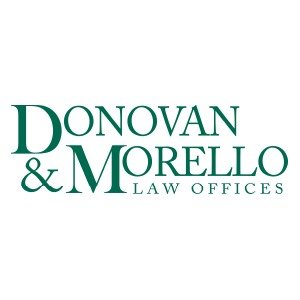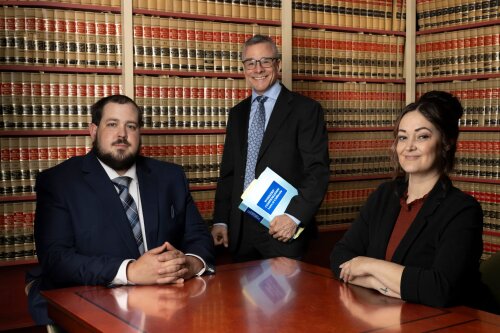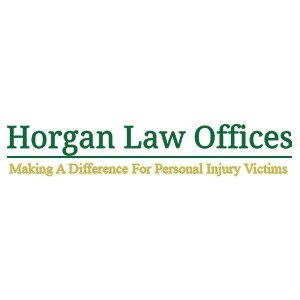Best Personal Injury Lawyers in Connecticut
Share your needs with us, get contacted by law firms.
Free. Takes 2 min.
Or refine your search by selecting a city:
List of the best lawyers in Connecticut, United States

About Personal Injury Law in Connecticut, United States
Personal injury law in Connecticut is designed to compensate individuals who have suffered harm due to the negligent or intentional actions of others. This area of law covers a wide range of incidents, including car accidents, slip and fall cases, medical malpractice, product liability, workplace injuries, and more. The main objective is to restore the victim, as much as possible, to the position they were in before the injury occurred. Compensation often includes medical expenses, lost wages, property damage, and pain and suffering.
Why You May Need a Lawyer
If you have been injured due to someone else’s actions or negligence, working with a personal injury lawyer can be very beneficial. Common situations where legal help is advisable include:
- Car, truck, or motorcycle accidents where another party is at fault
- Slips, trips, or falls on another person’s property
- Medical mistakes or healthcare provider negligence
- Injuries caused by defective products or dangerous drugs
- Work-related injuries not covered or disputed by workers’ compensation
- Dog bites or injuries caused by animals
- Accidents resulting in serious long-term injuries or disability
- Disputes over compensation or dealing with insurance companies denying your claim
A specialized attorney can help investigate your case, negotiate with insurers, gather necessary evidence, and represent you in court if required. They ensure your rights are protected and that you receive fair compensation.
Local Laws Overview
Connecticut has specific statutes and regulations that impact personal injury cases:
- Statute of Limitations: Generally, you have two years from the date of the injury to file a personal injury lawsuit. Some cases, like those involving government entities, may have shorter timeframes or special notice requirements.
- Comparative Negligence: Connecticut follows a modified comparative negligence rule. If you are less than 51 percent responsible for your injury, you can recover damages. Your compensation is reduced in proportion to your percentage of fault.
- Damage Caps: Connecticut does not cap damages in most personal injury cases, though punitive damages and some medical malpractice awards may have limitations.
- Insurance Requirements: Connecticut mandates minimum auto insurance coverage, which can impact recoveries in vehicle accident cases.
- Premises Liability: Property owners tend to bear responsibility for maintaining safe environments for visitors. Different rules apply depending on whether the injured party was an invitee, licensee, or trespasser.
Understanding these laws can help you better navigate your legal options if you have suffered an injury in Connecticut.
Frequently Asked Questions
What should I do immediately after a personal injury accident?
Seek medical attention, document the scene with photos if possible, gather witness contact information, and report the incident to appropriate parties. Avoid discussing fault and do not sign any documents without legal advice.
How long do I have to file a personal injury claim in Connecticut?
Typically, you have two years from the date of the injury, but deadlines may vary depending on the type of case and the parties involved. Contact a lawyer promptly to preserve your rights.
What compensation can I recover in a personal injury case?
You may be eligible for compensation covering medical bills, lost wages, pain and suffering, property damage, and in some cases, punitive damages intended to punish exceptionally wrongful conduct.
Can I file a claim if I was partially at fault for the accident?
Yes, Connecticut’s modified comparative negligence law allows you to seek damages as long as you are less than 51 percent at fault. Your recovery will be reduced by your percentage of fault.
Do I have to go to court to receive compensation?
Many personal injury cases settle out of court through negotiations with insurance companies or the opposing party. However, litigation may be necessary if a fair agreement cannot be reached.
How do contingency fee arrangements work?
Most personal injury lawyers in Connecticut work on a contingency fee basis, meaning you only pay attorney fees if you receive compensation. Fees are usually a percentage of your recovery.
Can I handle my personal injury claim without a lawyer?
It is possible to handle minor cases on your own, but having a lawyer is strongly recommended when injuries are serious, liability is disputed, or significant compensation is involved.
What is the process for a personal injury lawsuit?
After seeking medical care, you or your attorney will gather evidence, negotiate with insurers, and, if needed, file a lawsuit. The court process includes discovery, settlement discussions, and possibly a trial.
What if the person who caused my injury does not have insurance?
You may be able to seek compensation through your own insurance policies, such as uninsured or underinsured motorist coverage, or pursue personal assets of the at-fault party in rare cases.
Are emotional and psychological injuries compensable?
Yes, Connecticut allows compensation for mental anguish, emotional distress, or psychological trauma resulting directly from the incident, in addition to physical injuries.
Additional Resources
Individuals seeking more information or assistance regarding personal injury law in Connecticut may find the following resources helpful:
- Connecticut Judicial Branch - General public information on court processes and filings
- Connecticut Bar Association - Referral services for finding qualified attorneys
- Connecticut Department of Insurance - Guidance for claims involving insurance companies
- Office of the Healthcare Advocate - Assistance for those facing issues with medical bills or coverage
- Connecticut Legal Services - Legal aid access for individuals with limited financial resources
Next Steps
If you or a loved one has suffered a personal injury in Connecticut, here are recommended actions:
- Prioritize your health by seeking immediate medical care and following all treatment plans
- Document all aspects of the incident, including photographs, witness details, and communication with involved parties
- Consult an experienced Connecticut personal injury lawyer as soon as possible to discuss your options
- Avoid making statements or accepting settlement offers from insurance companies before obtaining legal advice
- Stay organized by keeping all records, bills, and correspondence related to your injury
A knowledgeable legal professional can guide you through the complexities of the personal injury claims process, protect your interests, and help you pursue the compensation you deserve.
Lawzana helps you find the best lawyers and law firms in Connecticut through a curated and pre-screened list of qualified legal professionals. Our platform offers rankings and detailed profiles of attorneys and law firms, allowing you to compare based on practice areas, including Personal Injury, experience, and client feedback.
Each profile includes a description of the firm's areas of practice, client reviews, team members and partners, year of establishment, spoken languages, office locations, contact information, social media presence, and any published articles or resources. Most firms on our platform speak English and are experienced in both local and international legal matters.
Get a quote from top-rated law firms in Connecticut, United States — quickly, securely, and without unnecessary hassle.
Disclaimer:
The information provided on this page is for general informational purposes only and does not constitute legal advice. While we strive to ensure the accuracy and relevance of the content, legal information may change over time, and interpretations of the law can vary. You should always consult with a qualified legal professional for advice specific to your situation.
We disclaim all liability for actions taken or not taken based on the content of this page. If you believe any information is incorrect or outdated, please contact us, and we will review and update it where appropriate.
Browse personal injury law firms by city in Connecticut
Refine your search by selecting a city.













